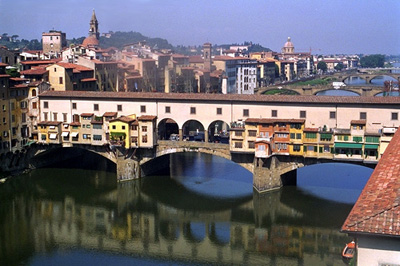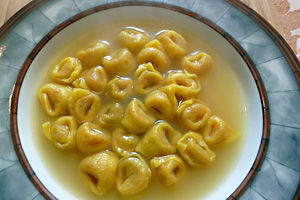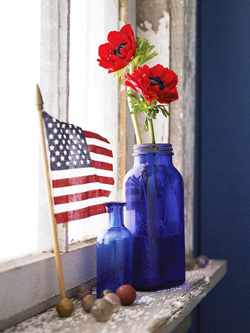 From the time I was in nursery school until I graduated from high school, I never spent a summer in my home state of Michigan. Most summers we went to Maine, but for three summers, we headed not to the rocky, Atlantic coast, but across that ocean to Europe. The middle summer when I was fifteen, we explored England, Italy and France deeply and passionately. My mother, possibly the best trip planner ever to draw breath, spent nearly a year before the trip selecting the perfect bed & breakfasts, auberges and pensiones for us.
From the time I was in nursery school until I graduated from high school, I never spent a summer in my home state of Michigan. Most summers we went to Maine, but for three summers, we headed not to the rocky, Atlantic coast, but across that ocean to Europe. The middle summer when I was fifteen, we explored England, Italy and France deeply and passionately. My mother, possibly the best trip planner ever to draw breath, spent nearly a year before the trip selecting the perfect bed & breakfasts, auberges and pensiones for us.
The things we wanted to see were an odd mixture of The Things One Sees in Europe (The Coliseum, The Louvre) and things my father wanted to see (the famous “Black Madonna” of Urbino). A consummate networker long before the days of the internet, my mother communicated her charm and enthusiasm via weightless, pale blue aerogrammes that appeared in the mailbox all year, one memorably addressed to “La Famiglia Graham;” by the time we boarded the plane for Frankfort in June, deposits were made, and an assortment of feather beds, duvets and hand-embroidered pillow cases awaited our travel weary bodies.
We fell hard for Florence, so hard that my mother cancelled our reservations in Venice and booked an extra week. Our “insider” guide was a colleague of my father’s, an Italian professor named Bob (and a “real” Italian), the leader of a group of Michigan State University students studying in Florence for the summer session. Bob had rented a villa at the top of an impossibly steep hill lined with Cypress trees to which we ascended one afternoon for bread, cheese, olives, and a plate of salami, soppressata, and prosciutto.
Despite my deep, adolescent sullenness, and persistent panic about the fact that I could not get enough volts at the pensione to blow my frizzy hair straight, I felt it. I understood that the sunny, breezy top of an Umbrian hill with a full glass of red wine and a the sharp hit of good Parmesano on a piece of crusty bread was an astonishing bit of good fortune.
 A day or two later, after the long, satisfying siesta that marked a dark and cool break in a summer day, Bob took us to a “little restaurant he knew” where the Tortellini en Brodo and chicken roasted with rosemary were simple and fine, and a roster of semi-retired opera singers performed arias after dinner to applause that escalated as the Vinsanto flowed. We grew accustomed to the rhythm of our Florentine life. First breakfast of an odd, dry, plastic-wrapped bun called a “Mister Mike” and a sublime cup of coffee with hot milk from a sputtering and noisy macchina, then exploration of the City, lunch of soup or pasta, a long siesta on cool sheets with closed shutters, and a late, multi-course dinner.
A day or two later, after the long, satisfying siesta that marked a dark and cool break in a summer day, Bob took us to a “little restaurant he knew” where the Tortellini en Brodo and chicken roasted with rosemary were simple and fine, and a roster of semi-retired opera singers performed arias after dinner to applause that escalated as the Vinsanto flowed. We grew accustomed to the rhythm of our Florentine life. First breakfast of an odd, dry, plastic-wrapped bun called a “Mister Mike” and a sublime cup of coffee with hot milk from a sputtering and noisy macchina, then exploration of the City, lunch of soup or pasta, a long siesta on cool sheets with closed shutters, and a late, multi-course dinner.
Every day brought revelations. Pasta did not swim in red sauce, but was an art form appearing in forms long, short, rough, filled, tubular, miniscule, hat-like, ear-like, and having a character that made mere accessories of even the most august tomatoes, olive oil and cheese. I coveted the high heels I saw on women rushing across cobbles, up hills and stairs, and badgered my parents into buying me a pair of precipitous, stunning leather sandals only to shred my feet to a bloody pulp during a long day of walking. This might have been tragic, except that the wounds necessitated a visit to a neighborhood drugstore for bandages; I could happily have spent a month looking at the exotically named shampoos, soaps and herbal infusions to cure everything known to mankind. My brother had a sudden bloody nose on the street one afternoon, whereupon a strange woman stopped us with a raised hand, anxiously said something about “il bambino” (little boys are the unofficial royalty of Italy) and shoved a wad of something called “Stop Hemo” up his nose. It worked, and we all parted with a hail of “mille grazies” and smiles.
 During that first week, amidst our days of navigating diesel-scented stradas and studying the faces in Brunelleschi’s Baptistry door, came American Independence Day. Immersed as we were in losing all traces of tourist-hood, it was a complicated thing to decide what, if anything, to do about The Fourth. As it turned out, Bob’s students wanted to recognize the day, and we joined them for a celebration at the student pensione where they were spending the summer term. We sat at a long table covered in white linen, a dilapidated American flag stuck in a vase at the center of the table.
During that first week, amidst our days of navigating diesel-scented stradas and studying the faces in Brunelleschi’s Baptistry door, came American Independence Day. Immersed as we were in losing all traces of tourist-hood, it was a complicated thing to decide what, if anything, to do about The Fourth. As it turned out, Bob’s students wanted to recognize the day, and we joined them for a celebration at the student pensione where they were spending the summer term. We sat at a long table covered in white linen, a dilapidated American flag stuck in a vase at the center of the table.
The pensione’s cook made for us what she imagined to be an American meal; small patties of chopped beef served on crusty rolls with Mozzarella, tiny potatoes roasted in olive oil, a marinated vegetable salad and gelato with macerated fruit for dessert. In addition to the usual bottles of wine and sparkling water, there was (Italian) beer. We sat together, a small band of the temporarily expatriated, on a tiny island of Americana in the midst of a bustling Florentine evening. Outside shop owners were pulling down metal grates, couples were heading out for the evening, and old men were playing Bocce; inside the run-down dormitory dining room we sang all the patriotic songs we could think of, ate our ersatz but superlative burgers, and thought of home.
No matter what we wore, ate, saw or said with a touch of sprezzatura, we were still Americans-ugly, envied, hated, fortunate, uncivilized, beloved Americans abroad. In the midst of our beautiful, illusory time as Fauxtalians there was that night when we sat together and thought of what was sacrificed so that we could live in relative freedom with a sense that we could always make things better, start fresh, light out for the territories. Oddly, the absence of flag bunting, parades, two-day sales and fireworks displays stripped patriotism to its essentials: we remembered what the party was about.
By the end of the night, when the manager of the pensione brought in a single, sputtering cherry bomb there wasn’t a dry eye in the house. Jefferson, Washington, Franklin and Adams would have been delighted.
Ann Graham Nichols cooks and writes the Sprezzatura blog in East Lansing, Michigan where she lives in a 1912 house with her husband, her son and an improbable number of animals.

